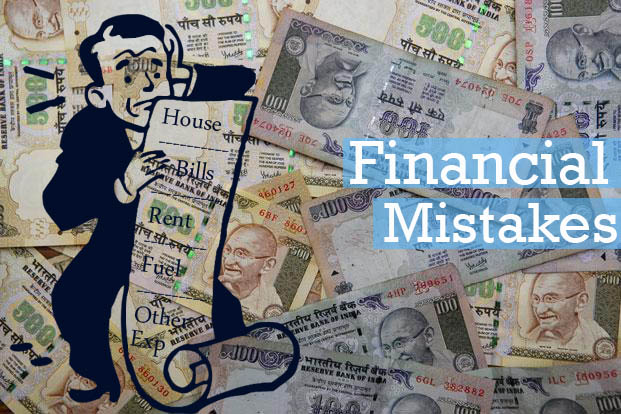Youth is when you’re supposed to make mistakes. Some mistakes you get forgiven for, and others you do not. Financial mistakes fall firmly in the latter category. Fail to do right by your money when you are young and active, and your money is more than likely to desert you when you are old and tired.

Today, we shall go over some of the most common mistakes that young people make when dealing with their finances and counsel you on how to avoid them as well.
Excessive spending on non-essentials
We live in world where consumerism is rampant. Messages are piped into our brains through the television, on the roads as we walk and on the websites we visit, exhorting us to buy more and more things. Junk food, movies, hot new nightclubs, cool café’s, fancy restaurants. The number of things we can spend on seems to increase exponentially compared to our incomes. And that’s exactly why we should not. Eating out once a week can add fifty thousand to your annual spending. Buying coffee from a Starbucks every day as opposed to drinking it from your office canteen makes a difference of over a hundred-and-fifty rupees every time you drink a cup. So every time you spend what you think is a trifling amount, try and calculate how much it comes to on an annual basis. Could end up being rather more than you budgeted for.
Recurring payments and late fees
Bills. Electricity bills. Cable TV. Mobile phones. Internet at home. Internet on-the-go. The average family probably pays more bills than can be counted on one person’s hands.
Now obviously I am not suggesting you do not pay the bills. Rather, explore which of them are necessary. Do you really need two mobile phone numbers? Is the internet-on-dongle required if you mostly use your mobile phone to access data anyway? If you only watch three channels, why are you paying for two-hundred-and-seventy-five?
And if you DO have bills, pay them on time. This cannot be emphasised enough. Do not wait till the last day to make a payment. One day late, an unexpected bank holiday, your cheque takes too long to clear…companies will not hear any excuses before slapping a late fee on you. Why pay more? Pay your bills well before the last date and save money and anxiety.
Not having health insurance
If you follow our website, you know that we have spoken at length before about the importance of being adequately insured for a medical emergency. This is a critical financial issue as well. An unexpected medical expenditure can leave you without resources and wreck any financial planning you may have.
Using credit cards for things you cannot afford
Credit cards are useful – they save you the trouble of carrying cash and you gain from not having to spend immediately as well, but the danger is that credit card limits are sometimes too generous, and we end up buying things we may otherwise not. Swiping a card seems easier than forking out cash and we do end up not thinking of how much we have spent when it’s just a number to sign under than when it is banknotes to be counted. Resist the temptation. Even when using a card, try to picture the payment as being made in hard cash.
Buying too large a house
Sooner or later, every young person tries to buy a house. And no matter your requirements, builders and agents will do their level best to sell you a house that’s beyond your budget. Now that’s their job, so there is no point in blaming them, but it’s we who need to be on our guard. If your intent is to buy a 1BHK, do not be tempted by a 2BHK. If you have a budget of X, do not end up spending 1.6X just because you were taken in by a pretty building. A house is a long-term, illiquid investment and the more expensive it is the more you pay in EMI’s and the more dependent you become on your means of income. Make a budget, albeit a realistic one, and find a house that fits it, rather than making your budget fit a house.
Buying goods on instalments
Buying on instalments seems to be a win-win situation. You feel like you’re paying a dealer, it let’s you buy a fancy TV or fridge or washing machine before you normally could. But do not forget that you’re ultimately taking a loan, and a high-cost one. Unless you feel that the loan is a reasonably-priced one, do not opt for instalments and prefer to go for goods you can afford yourself.
Not keeping a cash cushion
Cash cushion. Ready money. Liquidity. In paying bills, Emi’s, home loans, we sometimes forget to keep money readily available. Emergencies could come any time, emergencies requiring upfront payment. Medical, legal, property-related…in fact you could even lose your job and need ready money just to meet expenses.
As a thumb rule, your bank account must always have enough money to cover six months expenses, anything less and you are taking a risk.































